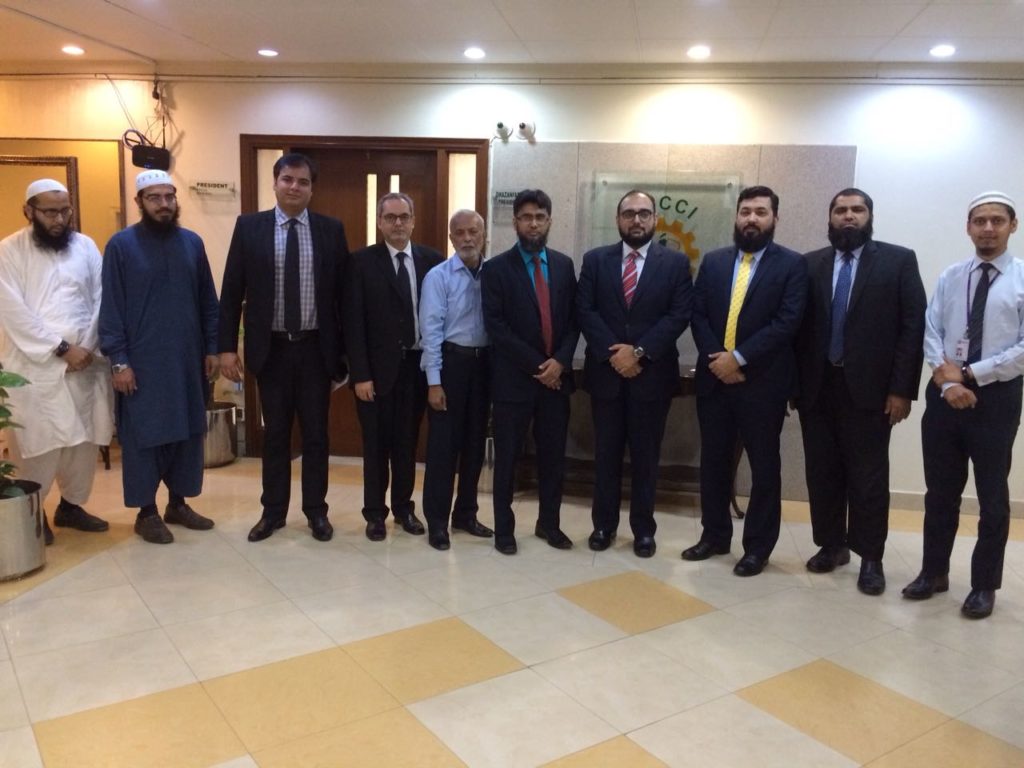 Though, the first move to achieve Shariah compliance in Pakistan was made in mid eighties by allowing operation of Modaraba companies, the real growth came after launching of first ever full service Islamic commercial bank, Meezan Bank in 2002.
Though, the first move to achieve Shariah compliance in Pakistan was made in mid eighties by allowing operation of Modaraba companies, the real growth came after launching of first ever full service Islamic commercial bank, Meezan Bank in 2002.
Conventional commercial banks were also allowed to open up designated Islamic banking branches. The result is that now slightly less than 12 per cent of total banking assets are controlled collectively by Islamic banks and branches of conventional banks offering Islamic banking services.
Islamic mutual funds have also registered massive growth. Al Meezan Investment Management, a subsidiary of Meezan Bank, now has more than Rs43 billion assets under its management, out of total of Rs385 billion assets under management of all the asset management companies put together.
As against this, growth of Takakul has remained subdued, despite not allowing the conventional insurance companies to open up Takaful windows. According to initial permission, Takaful operators were also required to offer their shares to general public, which they didn’t.
With the expiry of this embargo period, there is pressure on the Government of Pakistan (GoP) to allow the conventional insurance companies to establish Takaful windows. The basic argument is, if conventional banks were allowed to establish designated Islamic banking branches, why should there be an embargo on conventional insurance companies on establish Takaful windows?
Experts are of the consensus that the credit of double digit growth of Islamic banking goes to State Bank of Pakistan (SBP). Shariah compliance is the most important aspect of Islamic banking and finance. The credibility of these Institutions not only depends on the financial health but also on their compliance of Shariah covenants.
Under the current strategy for promotion and development of Islamic banking as a parallel, viable and compatible banking system, SBP has taken a number of steps to ensure Shariah compliance.
Shariah Compliance structure put in place by the SBP include: 1) creation of Shariah Board at the central bank, 2) appointment of Shariah Advisor as per an elaborate criteria, 3) preparation of essentials model agreements of Islamic modes of financing, 4) development of comprehensive guidelines for Shariah compliance and 5) gradual adoption of AAOFI Shariah standards. All these initiatives are being taken according to the second five-year strategic plan developed by the SBP with the consensus of all the players.
The SBP has chalked out the plan aiming at increasing share of Islamic banking institutions (IBIs) to 15 per cent of overall banking industry by 2017. The draft of Islamic Banking Strategic Plan 2013-17, has been sent to all the stakeholders for their feedback. Once approved, it will be the second five-year strategic plan; the first was for 2007-12.
The IBIs didn’t succeed in achieving the target of 12 per cent market share by end 2012 due to economic slowdown in the aftermath of 2008 global financial crisis and looming energy crisis in the country.
The SBP has decided to boost share of IBIs in the rural areas by involving them in lending to farmers. It has been proposed that IBIs will extend loans to farmers, equivalent to 5 per cent of the deposits or 10 per cent of total financing by 2014, whichever is higher.
In this regard Islamic banks will be fully supported by the SBP and other related bodies. The key objective is to increase lending to farmers through Shariah-based financing which has been largely dominated by conventional commercial banks and informal lenders.
In order to strengthen Shariah compliance framework and to strengthen Shariah compliance oversight and standardization and harmonization of Islamic banking and finance products across the industry, it has been proposed to quickly adopt Shariah standards issued by Accounting and Auditing Organization of Islamic Financial Institutions (AAOIFI).
In order to strengthen liquidity management of IBIs, development of Islamic pricing benchmark has been suggested, besides development of Shariah compliant instruments. The strategic plan of SBP also suggests development of incentive mechanism for Islamic low cost housing financing and providing funds to small and medium enterprises.
The plan specifically focuses on promoting housing and construction in the metropolis and small cities on easy installments and softer terms and conditions. The SBP plans to offer low cost Islamic housing finance to enable the middle and lower middle classes of the society to fulfill their housing needs.
With global Sukuk market likely to cross US$150 billion mark, Pakistan has also witnessed tremendous growth in Sukuk flotation, which was mainly due to flotation of Ijarah Sukuk by the GoP. These Sukuk have attracted a lot of attention due to three major reasons: 1) Islamic banks getting a Shariah compliant placement avenue for the ever-growing deposit base t, 2) offering effective liquidity management tool through development of secondary market and 3) providing an alternate investment avenue, which Shariah compliant but offers attractive returns as compared to deposits.
This article was originally published in Islamic Finance News, Malaysia

If you read the complete text of s speech of Governor State Bank of Pakistan, you will get the replies of most of your questions. I will be uploading details of the roadshow by this weekend.
Saved as a favorite, I really like your web site!
Thanks
whoosh this weblog is fantastic I love studying your posts.Keep up the great work! You understand, a lot of individuals are looking round for this information, you can help them greatly.